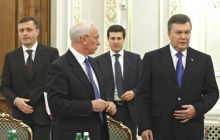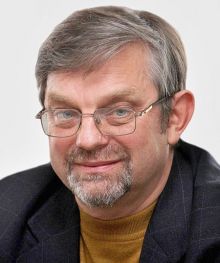After a series of cardinal portfolio redistributions in the Verkhovna Rada and the Cabinet of Ministers, the president’s inner circle has decided to reorganize his Administration. This follows from a recent announcement of Presidential Administration Chairman Serhii Liovochkin. The projected reformation is necessary for carrying out a number of key assignments the head of state has given. According to Liovochkin, Viktor Yanukovych has set out a three-pronged approach: implementing social initiatives, increasing the effectiveness of communication between the head of state and society, and developing the humanitarian and social aspects of governmental work. This is what we began with our interview with Viktor NEBOZHENKO, a political scientist, director of the sociological service Ukrainian Barometer.
Mr. Nebozhenko, what do you think about the president’s initiative to reform his Administration?
“The Presidential Administration (PA) has set the right goals for reformation. On the other hand, this means that the PA has been doing nothing in this direction for almost three years. It is also, in a way, the fault of Liovochkin who has been doing anything but what he has stated. Therefore, if the president is speaking today of a three-pronged approach in the Administration’s work but still keeps PA top executives in their offices, this means that either these people are precious to him or the three abovementioned directions are not important to him. If any serious staff replacements occur in the PA, this may be also followed by structural changes, but if no new people come to the Administration, all the aforesaid declarations are nothing but a purely bureaucratic bluff.”
You said recently that the induction of Serhii Larin into the PA was more important than the appointment of new National Bank and Security Service chiefs. It is known that Larin will be in charge of such things as improvement of the way public messages to the head of state are treated as well as regional and staff placement policy. What does this mean?
“The Administration is not seriously involved in the regional policy, which is a major drawback. If Larin really receives carte blanche from the president to make serious staff replacements and shape a regional policy, now inexistent in Ukraine, his clout will, of course, be the same as that of Liovochkin. In this case, governors, deputy governors, and some Cabinet ministers will be dealing with Larin rather than Liovochkin. If the composition of any regional administration is to depend on Larin, these people will, naturally, be turning to him more often than to Liovochkin. But all this may still remain a mere declaration. We do not know so far if these structural changes will allow Larin to self-realize. All we know is that he has not come here to just idle around.”
What do you know about Larin himself?
“In comparison to other ‘Regionnaires,’ he has an extraordinary life story. He has never had any problems with the law, has a political education and has been dealing with Party of Regions elections campaigns for a long time. It is logical enough that he, quite a strong professional, should be in the Administration now. Larin and Yanukovych have known each other for years. Not a member of the Donetsk clan, he is one of those political ‘Regionnaires’ who have grown up together with the Party of Regions and Yanukovych. It would be wrong to say that he is part of any pressure group. We can see today that Larin has been promoted to PA deputy chief and a former Donetsk mayor to parliament speaker. This illustrates the Party of Regions’ growing influence in Ukraine. It is out of the question that Larin is closely linked with the Family or Yanukovych – he only represents the human resource that the Party of Regions is actively tapping, as it rules the roost in this country.
The Administration is not seriously involved in the regional policy, which is a major drawback. If Larin really receives carte blanche from the president to make serious staff replacements and shape a regional policy, now inexistent in Ukraine, his clout will, of course, be the same as that of Liovochkin. In this case, governors, deputy governors, and some Cabinet ministers will be dealing with Larin rather than Liovochkin.
“Taking into account that the current leadership usually makes appointments on the basis of human relationships rather than professionalism, this is in no way the most unsuccessful appointment. Larin is a good choice, for he is knowledgeable about staff placement and regional policies. Ukraine needs a person who hails from a specific region and is capable of working in such a manner that the existing vertical chain of command will also heed the interests of oblasts and big cities. Larin is aware of this. His appointment and the related emphasis on regional policies show that the president has understood, albeit belatedly, that he will not manage to rule this country in a purely administrative way. One should take into account the specifics and interests of different regions. This is a right and universally accepted behavior. The Administration must turn from an injunctive body, which makes extensive use of the president’s powers, into a political body.”
The Administration will also have a directorate for the reformation of law-enforcement and judicial bodies with Andrii Portnov, the head of state’s advisor, at the head. Besides, he will be in charge of the directorates that deal with representation of the president’s interests in courts, the court system, and presidential pardon. Another interesting detail: Portnov will be directly subordinated to PA Chairman Liovochkin – he will not be under the control of the latter’s deputies. Will you comment?
“While Larin is a Party of Regions follower, Portnov is one who will cooperate with any president if he derives benefit from this. He has made quite an effort to turn the Ukrainian judicial system from a branch of power into a part of the administrative resource. Like Azarov in the Cabinet, he prefers ‘manual control.’ But courts can only be controlled in a criminal, ‘manual,’ and unlawful way. This is sure to continue. It is only unclear why they should emphasize that he is directly subordinated to Liovochkin – this is not a thing done at the PA system. It is in any case clear that every PA official is subordinated to the chairman. Those who are not subordinated to the chairman are answerable to the president himself. Otherwise, this sounds like a forced option.”
Incidentally, the opposition claims that the delay in the election of the Supreme Court head is caused by the absence of a candidate who would enjoy the president’s trust and stand chances to win the election. What do you think the problem is?
“Firstly, the very attitude of our opposition is objectionable. They seem to politically admit that the Supreme Court – one of the independent branches of power, one of the strongest instruments of democracy – is part of the president’s political roulette. Nowhere in the law is it written that the Supreme Court head is appointed by the president. This means that the opposition has resigned itself to a certain authoritarian regime now being formed in Ukraine. I don’t think it is a problem for the president to find a court head. He has an absolutely empty Constitutional Court through which he can easily solve any problem. For the Supreme Court has lost some of its powers. So it is not clear why, instead of defending the political groups that brought it to parliament, the opposition is doing something entirely different. To tell the truth, the problem of the appointment of the Supreme Court head mirrors the real state of affairs in the judicial system. Should the president in fact appoint the SC head in plain view of the public, all the other levels of judicial power will naturally accept the rules of the game – what will matter for them is not the law but political expediency. The opposition should speak this out. Otherwise, it will be just distracting society from these problems and trying to persuade us that everything depends on one person. Then what depends on the opposition?”
Could you comment on the opposition’s initiative to introduce criminal liability for non-personal voting in parliament?
“No strict punishment should be meted out to those who themselves vote for this procedure. The opposition knows only too well that nobody will ever vote for five, six or one year, or even one day, of punishment for breaking the personal vote law. This only shows that the opposition is in confusion and has not found its own game at the Verkhovna Rada.”
Then who or what can be an alternative to government decisions?
“Over the past 20 years, national democrats have always been appealing to the public, the street, and the media, which has a more serious effect than when the opposition tries to make a serious face to a political regime that is not afraid of it. In other words, lack of communication between the current opposition and the electorate make the former impotent. If they were appealing to the populace and pointing to every fault of the government, this would give an altogether different result.
“Could we have ever thought that the Communists and nationalists would be voting together for the death of Ukrainian young men in hot spots? This is nothing but a conspiracy against the national interests of Ukraine. As Svoboda sides with the Communists in this voting, how can we believe in its antagonistic attitude to the Communist Party?”
But our servicemen are sent to hot spots at their wish, without any coercion.
“That is right. But I am speaking of a concrete suspicious interaction between such political adversaries as Communists and nationalists. This process of backsliding and attempts to make small deals may result in Svoboda being a political bubble – only because it votes side by side with the Communists. There is only one item on which national democrats can vote together with the Communists – it is the Customs Union question. The Communists also puzzle me. They are forming an antifascist association and, at the same time, voting with nationalists. This is very bad for Ukrainian parliamentarianism.”
Another telling example is unsuccessful voting to decriminalize the article about Tymoshenko.
“Why did the entire opposition not vote? Why did even those who came to parliament on behalf of Tymoshenko fail to vote? Again, the whole unsuccessful voting story is nothing but a publicity ploy. They simply did their duty to Tymoshenko: look, we could do nothing! This shows the decay of the new parliament. Of course, let us hope that I am exaggerating the danger and we will see a good new parliament as a place of political activity.”








